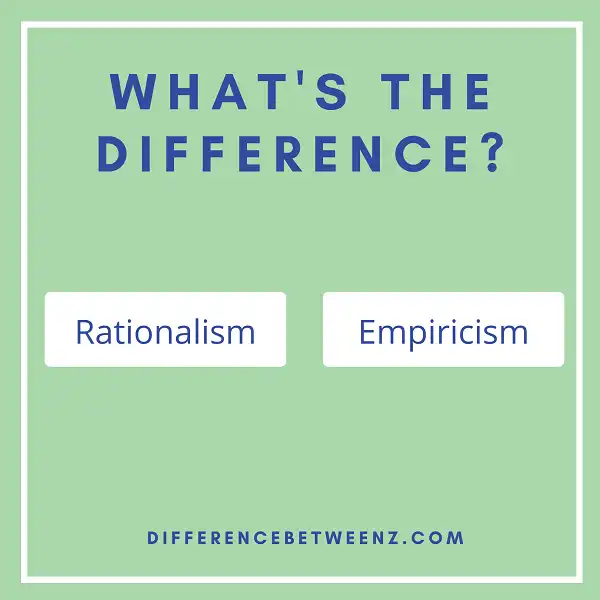What is the difference between rationalism and empiricism? Rationalism is a philosophical viewpoint that holds that reason is the chief source of knowledge. Empiricism, on the other hand, emphasizes the role of experience and evidence in acquiring knowledge. So, which one is right? Well, as with most things in life, it’s complicated. Each philosophy has its own strengths and weaknesses, and there is no one “correct” answer. In this blog post, we’ll explore the differences between rationalism and empiricism and see which approach might be best for you.
What is Rationalism?
Rationalism is a philosophical movement that began in the 17th century. Its central tenet is that reason is the primary source of knowledge and that individuals can use reason to discover the truth.
Rationalists believe that the world is knowable and that humanity can use reason to understand it. The most famous rationalist philosophers are René Descartes, Baruch Spinoza, and Gottfried Leibniz. Rationalism has had a significant influence on Western philosophy, science, and politics.
Many of the Enlightenment’s most important thinkers were rationalists, and the Rationalist tradition has continued to shape Western thought in the centuries since. Today, Rationalism remains an important force in philosophy, and its ideas continue to be influential in other disciplines as well.
What is Empiricism?
Empiricism is a philosophical theory that states that knowledge comes from experience and observation, rather than reason or logic. Empiricists believe that the only way to know something for sure is to experience it firsthand. This means that Empiricists are constantly testing and experimenting in order to gain new knowledge. Empiricism has had a major influence on the scientific method, as scientists rely on experimentation and observation to validate their hypotheses. It has also influenced philosophy, as Empiricists such as John Locke and David Hume have argued against the use of reason in favor of experience. Empiricism remains a controversial theory, but its impact on the world of ideas is undeniable.
Difference between Rationalism and Empiricism
Rationalism and empiricism are two of the most important schools of thought in philosophy. Rationalism is the belief that reason is the best tool for discovering the truth, while empiricism is the belief that experience is the best source of knowledge.
- Both Rationalists and Empiricists have contributed enormously to our understanding of the world, but they have very different views on how we acquire knowledge. Rationalists believe that our minds are able to grasp truths that are independent of experience.
- This means that we can know things without having to observe them directly. For example, Rationalists believe that we can know about the existence of an objective reality, even if we have never experienced it ourselves.
- Empiricists, on the other hand, believe that all knowledge is based on experience. This means that we cannot know anything without first observing it firsthand. Empiricists would argue, for instance, that we cannot know about an objective reality unless we have experienced it ourselves.
Rationalism and empiricism are two very different ways of looking at the world, but both have been highly influential in shaping our understanding of knowledge.
Conclusion
Rationalists believe that the mind starts with certain innate ideas and then builds on these to form general principles. Empiricists, on the other hand, think that all knowledge comes from experience. So, which one is right? The answer may be a bit of both. It’s important to remember that humans are capable of reason and empirical observation. We can use our intuition to come up with hypotheses, and then test them through experimentation.


